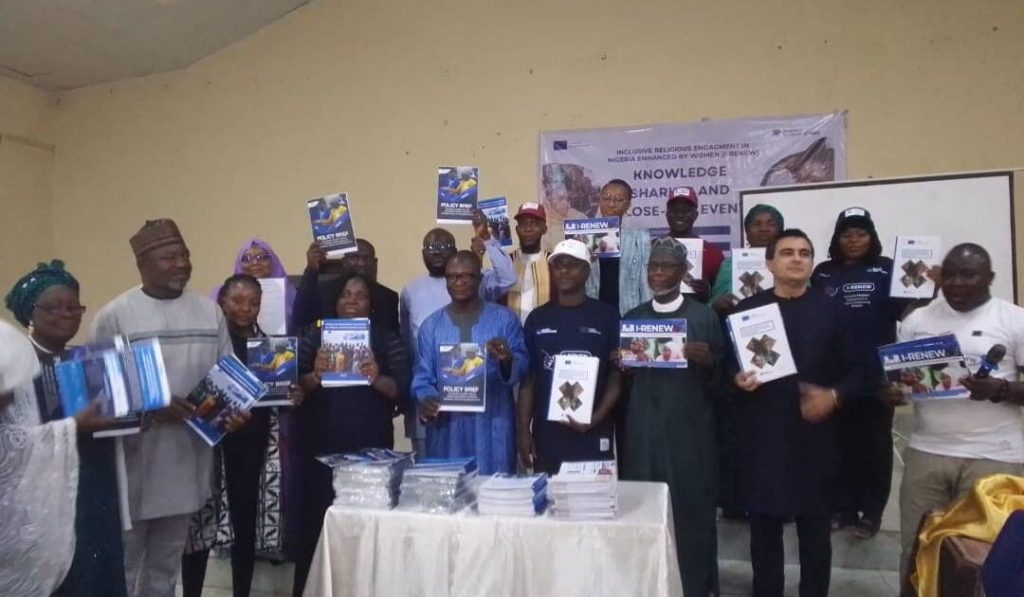The European Union, through its delegation to Nigeria and ECOWAS, has reaffirmed its unwavering commitment to nurturing peace, promoting inclusivity, and fostering grassroots development within Nigeria. This commitment was underscored by Reuben Alba, the Head of the EU delegation, during the culmination of the Inclusive Religious Engagement in Nigeria Enhanced by Women (I-RENEW) project in Jos, Plateau State. This 30-month peace-building initiative, funded by the EU and implemented by Search for Common Ground in collaboration with various partners, focused on fostering peaceful coexistence and resilience in conflict-prone regions of Nigeria, specifically Plateau and Kaduna States. Alba highlighted the I-RENEW project as a prime example of the EU’s dedicated approach to peace-building, emphasizing the possibility of harmonious living irrespective of religious, ethnic, or socioeconomic differences. The EU’s commitment extends to supporting initiatives that champion freedom, respect, and mutual understanding across diverse communities.
The I-RENEW project has yielded substantial progress in advancing religious inclusion and empowering marginalized groups within Plateau and Kaduna States. Key achievements include the establishment of the Plateau Youths Interfaith Forum, a platform for interreligious dialogue and collaboration among young people. The project also facilitated the rehabilitation of homes damaged by conflict, providing tangible support for affected communities and contributing to the restoration of normalcy. Furthermore, the installation of solar lights in vulnerable communities enhanced security and improved the quality of life for residents. These tangible outcomes demonstrate I-RENEW’s multifaceted approach to peace-building, addressing both immediate needs and long-term societal transformation.
Williams Ubimago, the Project Manager at Search for Common Ground, characterized the project’s close-out event as a moment to celebrate the tangible results of a sustained investment in freedom of religion and belief (FoRB). He emphasized that I-RENEW went beyond mere conflict mitigation, actively amplifying the voices of women, youth, and faith leaders in advocating for religious rights and community inclusion. This participatory approach ensured that the project resonated with the needs and aspirations of the communities it served, promoting local ownership and sustainability. By empowering these key stakeholders, I-RENEW laid the groundwork for long-term peace and social cohesion.
Nantip Joseph, representing Julie Sanda, the Director General of the Plateau Peacebuilding Agency, delivered the keynote address, commending I-RENEW’s inclusive and community-driven model. He emphasized that the frameworks and structures established during the project’s lifespan would continue to serve as valuable community assets, contributing to sustained peace-building efforts beyond the project’s formal conclusion. This enduring legacy highlights the project’s focus on building local capacity and creating sustainable mechanisms for conflict resolution and interfaith dialogue. Joseph’s call to stakeholders to consolidate the foundation laid by I-RENEW underscores the importance of collaborative engagement in sustaining peace.
Gift Omoniwa, the Acting Country Director of Search for Common Ground, hailed the project as a transformative intervention, specifically addressing the historical exclusion of women and youth from religious and peace-building dialogues. By providing platforms and opportunities for these marginalized groups to participate meaningfully in peace processes, I-RENEW fostered a more inclusive and representative approach to conflict resolution. Omoniwa highlighted the project’s delivery of sustainable results, attracting continued support and influencing institutional responses to peace-building. This impact underscores the project’s effectiveness in promoting positive change and shaping broader peace-building strategies.
Personal testimonies further emphasized the project’s transformative impact on individuals and communities. Fatima Aliyu from the Kaduna cohort shared stories of personal and communal growth, highlighting projects such as interfaith football matches, the provision of boreholes for access to clean water, and the establishment of solar-powered community centers. These initiatives not only addressed practical needs but also fostered social interaction and understanding across religious divides. Blessing Lubo from the Plateau cohort underscored a shift from mere religious tolerance to genuine empathy and interfaith respect, pledging to continue advocating for religious freedom within her community. These individual stories of transformation illustrate the profound impact of I-RENEW on fostering peaceful coexistence and interfaith harmony at the grassroots level. The project’s concluding message was a call to action for stakeholders, government institutions, and community members to sustain the momentum generated by I-RENEW and to scale its inclusive models for wider peace-building initiatives across Nigeria. This call underscores the importance of collaborative efforts and sustained engagement in building a more peaceful and inclusive society.


